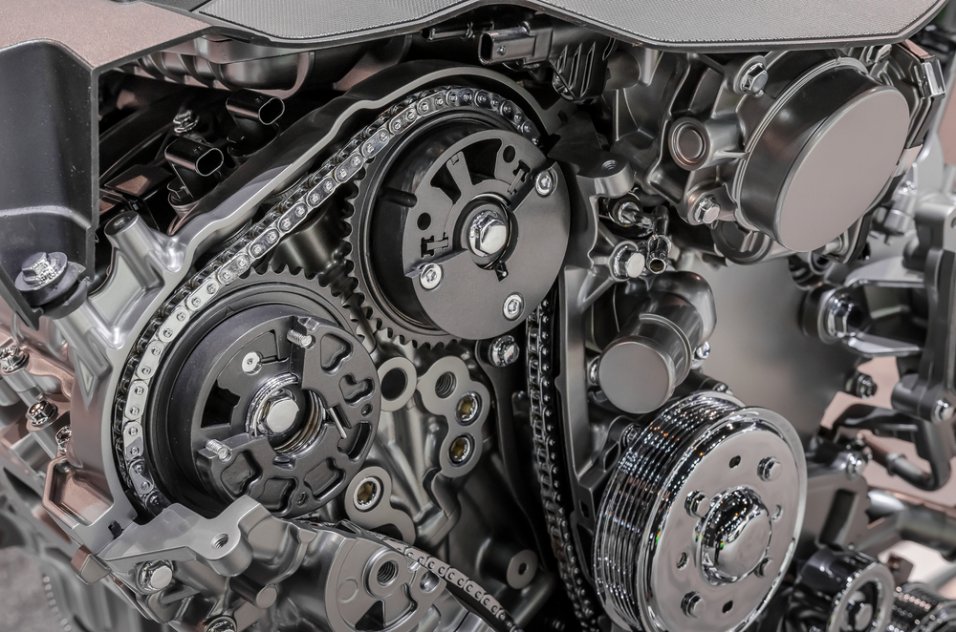Professionals to DIY
We're Online 9am - 5pm
On Orders Over £30
What is a Timing Chain? How to Manage Timing Chain Problems
What is a Timing Chain?
A timing chain is an internal engine component that's fitted to synchronise the rotation of the camshaft and the crankshaft — these two elements are essential for driving the wheels. The movement of the chain allows for engine cylinders to produce power to operate and propel the vehicle.

How?
The timing chain synchronises the opening and closing of the engine valves, known as intake and exhaust valves. It allows them to move at the required intervals to allow for the appropriate amount of fuel to enter the engine, and for exhaust to exit the engine. The process produces the exact amount of internal combustion required to drive at the desired speed.
The timing chain is an absolutely essential car part. Any vehicle that requires a timing chain will not operate without one.
How Often Does a Timing Chain Need to be Replaced?
Due to the way it operates, the replacement timeframe for a timing chain is based on mileage rather than age. It varies from vehicle to vehicle, and you should consult your owner’s manual for definite answers; but the expected range of a timing chain is around 60,000 to 100,000 miles.
What Are the Symptoms of a Failing Timing Chain?
The very nature of a chain unit means that failure often means total calamity. If the chain breaks, the part will no longer do its job and, unfortunately, the car will no longer be able to run.
But, issues don’t always mean complete failure of the part. The chain can show signs of wear and damage before it gives way completely. Look out for the following warning signs that your timing chain is about to reach the end of its life:
- Rattling Noise from Engine — A loose timing chain will rattle and clang about while you drive. Rattling noises of any kind coming from your engine are never good. At the first sign of this, get your car checked.
- The Engine Is Misfiring — If the timing chain has become worn out and stretched, its calibration will be off. This can result in engine misfires.
- There’s Metal in the Oil — If the timing chain is becoming fatigued, metal can flake away and get mixed in with oil in the engine that’s used to lubricate the chain. When you change the oil, you may see the signs of metal fatigue as flakes of metal in the oil.
- Check Engine Light — Sometimes there won’t be any noticable signs that the timing chain is failing, but sensors within the car will detect problems. The check-engine light could mean a problem with the timing chain, and should be addressed immediately.
What’s the Difference Between a Timing Chain and Timing Belt?
Mechanically, there is no difference between a timing chain and a timing belt. Both perform the same action and are attached to the same parts of your vehicle. The difference is in the material and location within the automobile. A timing belt is made of reinforced rubber and is housed outside the engine casing. A timing chain is made of metal links and housed within the engine unit. Timing belts are cheaper and easier to repair, but they don’t last as long as timing chains.
You cannot replace a timing belt with a timing chain, or vice-versa. The type of timing element used in a car is decided upon during the manufacturing processes and becomes a core part of design. They are not interchangeable.
How Much Does a Timing Chain Cost to Replace?
Timing chains are far from the most expensive engine component to replace. The part can often be sourced for less than £150, although depending on the make and model of the car, this figure can increase or decrease.
The problem is the actual removal of the damaged part and fitting of the new timing chain. Timing chains are built into the engine of the vehicle, which means access requires not only professional tools but also experience. Labour costs can add hundreds of pounds, taking total fees to around £600 or more.
Despite wanting to save money, it’s recommended that you do not fit a timing chain yourself, unless you have high levels of proficiency in car mechanics. There are some repairs amateurs can do themselves, but not this one. A poorly fitted timing chain can have serious consequences, and you may damage your engine in the process of attempting repairs.
Secure the best price for your timing chain with YMF Car Parts. Search with your registration now and find the exact part you need!




